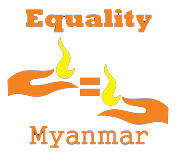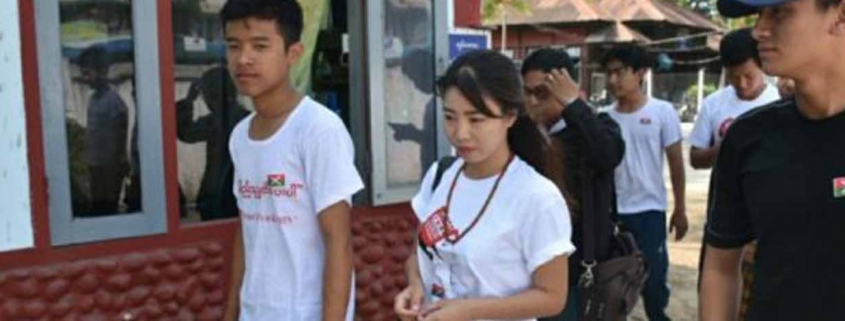By HEIN KO SOE and CLARE HAMMOND | FRONTIER
YANGON – Police in Myitkyina have told two Kachin student activists they will be prosecuted for leading a public demonstration calling for safe passage for around 1,500 civilians trapped in a conflict area in the northern state.
The civilians have been trapped for weeks in an area of jungle in Tanai Township controlled by the Tatmadaw, without access to humanitarian aid. Around 200 people were evacuated to safety yesterday, according to Myitkyina News Journal.
Ko Lum Zawng and Ma Sut Seng Htoi were summoned to Myitkyina police station at 8am today.
Police told them they would be charged under section 19 of the Peaceful Assembly and Peaceful Procession Law, Lum Zawng told Frontier by phone. If convicted, they could face up to three months’ imprisonment and a fine.
The pair intends to hold a press conference later today to discuss the charges, Lum Zawng said.
Following heavy shelling by the Myanmar military on April 11, around 1,500 people from Awng Lawt village tract in Kachin State’s Tanai township fled into an area controlled by the Tatmadaw.
Frustrated by the Kachin State government’s failure to respond to the crisis, young activists staged a public protest march in Myitkyina on April 30, to demand the evacuation of the displaced.
After the protest, the youth leaders organized a “sleep-in” at the Manau ground in the Kachin capital, which was attended by around 500 people.
By Monday, the number of demonstrators had grown to over 1,000, youth representative Seng Hkum told Frontier. He said they would continue to demonstrate until their demands were met.
On Monday, between 30 and 40 police armed with riot shields were deployed to the protest.
Armed clashes in April were reported across Kachin, in Hpakant, Tanai, Mogaung, Sumprabum, Injayang, Momauk, Chipwe and Waingmaw townships. Since the start of April, 6,800 people have been displaced by the fighting, according to the UN Office for the Coordination of Humanitarian Affairs.
The conflict now covers a larger area than it has in previous years, the Kachin Women’s Association Thailand said in a May 4 statement. They said fighting has spread to western and central Kachin, where the government is accelerating development and the extraction of resources including jade, amber, gold and timber.
Areas targeted include Sumprabum and Injangyang townships where Chinese-backed dams are planned on the Ayeyarwady River, as well as Tanai and Mogaung townships where the Ledo Road is being developed as part of China’s One Belt One Road initiative, the group said.
Humanitarian capacity in Kachin and northern Shan is already stretched, with more than 100,000 people displaced and living in camps.
The special rapporteur on the situation of human rights in Myanmar earlier this month expressed grave concerns over the escalation in hostilities.
Ms Yanghee Lee said on May 2 she had received reports that the military had carried out aerial bombings and used heavy weapons and artillery fire against civilian areas near the Chinese border.
“What we are seeing in Kachin State over the past few weeks is wholly unacceptable, and must stop immediately,” she said. “Innocent civilians are being killed and injured, and hundreds of families are now fleeing for their lives. Civilians must never be subjected to violence during the course of conflict.”
Last month, a group of 32 Kachin organisations urged the UN Security Council to refer Myanmar to the International Criminal Court, citing recent and historical atrocities.


 Equality Myanmar (EQMM) is a leading nongovernmental organization that organises a wide range of human rights education and advocacy programs, the documentation human rights violations, and provides emergency support for activists, human rights defenders, and their families. We work with a range of local civil society organizations, educators, activists, various local actors, and our programs and activities reach all states and regions in Myanmar.
Equality Myanmar (EQMM) is a leading nongovernmental organization that organises a wide range of human rights education and advocacy programs, the documentation human rights violations, and provides emergency support for activists, human rights defenders, and their families. We work with a range of local civil society organizations, educators, activists, various local actors, and our programs and activities reach all states and regions in Myanmar.
